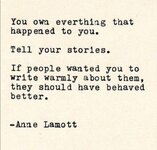Totally agree. I think most of us are like that. We write what we write because of who we are. I'd never choose to write a romance. I'm at home in the sardonic dark. I tend to think writing is a form of therapy. My first novel was an adult kids book and pretty much every character was (unintentionally) a person from my childhood. I only discovered this fact after I wrote it. One of the characters was a fastidious cuckoo who found fault in everything everyone did and told everyone what to do. Hello, Mum. That novel was a 65K long Freudian slip. I think with our writing, we re-create our inner world, or try to understand out inner world, or give it a voice, or something. Our experience shape us and come back in the writing.
Makes total sense, and it's not babble. I'm a (trained and resting) method actor. When I write, I need to internalise the character and the story I'm writing about, and feel them, nearly become them. It's like having an invisible twin, no, not a twin. It's another level of me. I'm currently writing a very dark story touching on human trafficking. My MC (Mia, a victim of child trafficking) is with me all the time, but I have to keep her at bay to a degree. I can't fully let her in as far as I'd like to, or I might end up with problems. It's challenging and disturbing to write her. This kind of topic gets into your bones. I'm having to pause and do something else at regular intervals, or I'll end up walking around with a permanently shell shocked expression on my face. I think authors can get so involved and so deep into our stories, I wouldn't be surprised PTSD could become an issue ... But going deep, (hopefully) makes for a deeper, more cohesive, more realistic story.
I'm finding that the border between my writing and my real life can become blurred, and that I need to actively set and keep the boundaries strong. Are you the same?
I suppose there's a discussion to be had: at what point is something real. Does it have to be physical to be real? Are we living something fully even if it happens only in our heads? I think so. After all, we dream smells, sights, feelings etc. Are they any less real? Where does our reality happen? In our heads? It's a bit like: if a tree falls in a forest does it make a noise if nobody is there to experience it?
There's a book called The Science of Story Telling by Will Storr. I haven't read much of it yet at all, but it seems to touch on that subject.
But now I'm babbling.


